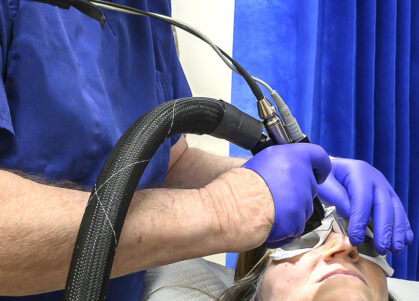Scientific Diagnosis
Successful skin cancer treatment starts with an accurate diagnosis, as many skin conditions can look similar. It is important to determine whether a lesion is active or benign to ensure the right course of action.
Our experienced consultants play a crucial role in this process, using their expertise alongside advanced diagnostic technology. This may include high-resolution imaging, digital microscopes, or laboratory analysis for a precise assessment.
Thanks to modern microscopy, the need for biopsies has reduced, but they are sometimes still necessary. If required, a small sample of the affected area is carefully removed, often under local anaesthetic, though in some cases, this may not be needed.
The sample is then analysed by a specialist pathologist with expertise in skin cancers. Results are returned quickly to your consultant, either to provide reassurance or to guide the next steps in your treatment plan.
Treating Skin Cancer
For advanced skin cancers, treatment may include chemotherapy, radiotherapy, or immunotherapy. However, in most cases—including melanoma—the most effective approach is complete surgical removal of the tumour.
Our consultant surgeons typically perform this as a day procedure, prioritising both successful treatment and the preservation of healthy tissue.
While some minor skin conditions can be managed with topical creams, surgery remains the most reliable option for effectively treating most cases of skin cancer.
- Malignant Melanoma
- Squamous & Basal Cell
- Mohs Micrographic Surgery
- Facial Skin Cancer
- Skin Lesions
- Facial Reconstruction
The primary need is to completely remove the cancerous tissue, although Mohs and wider surgical excision are both used with aesthetic requirements in mind.
Expert Skin Cancer Treatment & Reconstruction
At our London clinic, we work with both in-house and external specialists to offer Mohs surgery, a precise technique for skin cancer removal. Whether this or standard surgical excision is the best approach will depend on the specifics of each case.
In most cases, our experienced consultant surgeons can close wounds with minimal scarring, ensuring excellent healing. If a procedure could result in a noticeable cosmetic impact, plastic surgery options are readily available.
We are proud to have leading reconstructive and plastic surgeons as part of our team, alongside specialists experienced in treating facial skin cancers, head and neck cancers, and related oral cancers.
Above all, we believe in providing truly personalised care. Every skin cancer case is unique, and so is every patient. At our Harley Street clinic, you will receive a thorough diagnosis and a tailored treatment plan. If you are concerned about changes to your skin, abnormal moles, or potentially cancerous lesions, please reach out to our friendly team.


